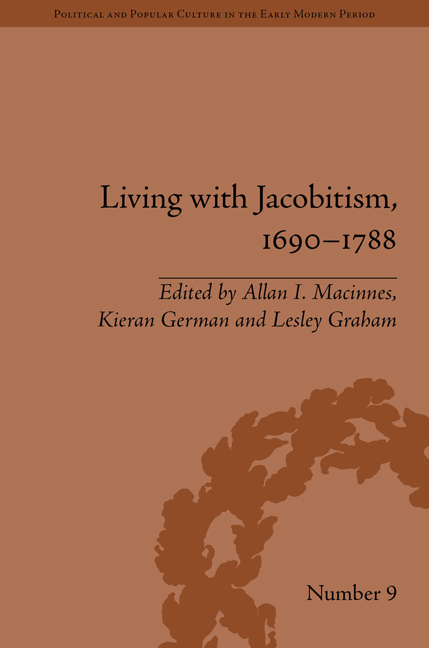Book contents
- Frontmatter
- CONTENTS
- List of Contributors
- List of Figures
- Abbreviations
- Preface: Breandán Ó Buachalla, A Tribute
- Introduction: Living with Jacobitism
- 1 The First Jacobite and the Scottish Parliament
- 2 The Scottish Jacobite Community at Saint-Germain after the Departure of the Stuart Court
- 3 Liturgy: The Sacramental Soul of Jacobitism
- 4 ‘Zealous in the Defence of the Protestant Religion and Liberty’: The Making of Whig Scotland, c. 1688–c. 1746
- 5 Jonathan Swift's Memoirs of a Jacobite
- 6 ‘Female Rebels’: The Female Figure in Anti-Jacobite Propaganda
- 7 Commerce and the Jacobite Court: Scottish Migrants in France,1688–1718
- 8 Ultramontane Ultras: The Intellectual Character of Irish Students at the University of Paris
- 9 To a Fair Meeting on the Green: The Order of Toboso and Jacobite Fraternalism, 1726–c. 1739
- 10 English and Scottish Jacobite Painters in Eighteenth-Century Rome
- 11 Polite War: Material Culture of the Jacobite Era, 1688–1760
- 12 Robert Adam: ‘My Mother's Dear British Boy’
- 13 From Jacobite to Jacobin: Robert Watson's Life in Opposition
- 14 Robert Louis Stevenson's ‘The Young Chevalier’: Unimagined Space
- Notes
- Index
2 - The Scottish Jacobite Community at Saint-Germain after the Departure of the Stuart Court
- Frontmatter
- CONTENTS
- List of Contributors
- List of Figures
- Abbreviations
- Preface: Breandán Ó Buachalla, A Tribute
- Introduction: Living with Jacobitism
- 1 The First Jacobite and the Scottish Parliament
- 2 The Scottish Jacobite Community at Saint-Germain after the Departure of the Stuart Court
- 3 Liturgy: The Sacramental Soul of Jacobitism
- 4 ‘Zealous in the Defence of the Protestant Religion and Liberty’: The Making of Whig Scotland, c. 1688–c. 1746
- 5 Jonathan Swift's Memoirs of a Jacobite
- 6 ‘Female Rebels’: The Female Figure in Anti-Jacobite Propaganda
- 7 Commerce and the Jacobite Court: Scottish Migrants in France,1688–1718
- 8 Ultramontane Ultras: The Intellectual Character of Irish Students at the University of Paris
- 9 To a Fair Meeting on the Green: The Order of Toboso and Jacobite Fraternalism, 1726–c. 1739
- 10 English and Scottish Jacobite Painters in Eighteenth-Century Rome
- 11 Polite War: Material Culture of the Jacobite Era, 1688–1760
- 12 Robert Adam: ‘My Mother's Dear British Boy’
- 13 From Jacobite to Jacobin: Robert Watson's Life in Opposition
- 14 Robert Louis Stevenson's ‘The Young Chevalier’: Unimagined Space
- Notes
- Index
Summary
In 1747 the veteran Jacobite John Gordon of Glenbucket was living in the town of Saint-Germain-en-Laye, to the west of Paris. He had gone into exile after the failure of the 1745 rising and, speaking no French, believed that he would find a Jacobite community with whom he could converse and socialize. He soon realized his mistake, so he asked to be allowed to occupy an apartment in the Château-Vieux de Saint-Germain. The letter which forwarded his request to Rome made it clear that in the town people only spoke French, whereas in the château he would be surrounded by people who spoke English. Gordon's mistake was perfectly understandable, and if he had gone to Saint-Germain at an earlier date, say 1697, 1707 or 1717, he would have found the town dominated by English-speaking Jacobite exiles like him. The intervening thirty years, however, had witnessed a steady decline in the Jacobite population, so that by 1747 it was only in the château that people were still speaking English.
From 1689 until 1712 the exiled Jacobite court had been based in the Château-Vieux de Saint-Germain, which had been the principal residence of Louis XIV before he moved the French court to Versailles. During that time the town had been occupied by the many household servants and pensioners for whom there was insufficient accommodation in the château, and by several thousand Jacobites who had joined their exiled king.
- Type
- Chapter
- Information
- Living with Jacobitism, 1690–1788The Three Kingdoms and Beyond, pp. 27 - 38Publisher: Pickering & ChattoFirst published in: 2014



